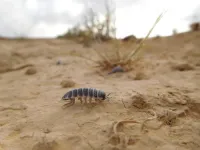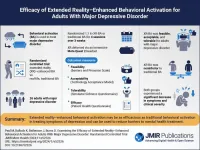(Press-News.org) Planetary scientists at the University of Colorado Boulder have discovered how Venus, Earth’s scalding and uninhabitable neighbor, became so dry.
The new study fills in a big gap in what the researchers call “the water story on Venus.” Using computer simulations, the team found that hydrogen atoms in the planet’s atmosphere go whizzing into space through a process known as “dissociative recombination”—causing Venus to lose roughly twice as much water every day compared to previous estimates.
The team will publish their findings May 6 in the journal Nature.
The results could help to explain what happens to water in a host of planets across the galaxy.
“Water is really important for life,” said Eryn Cangi, a research scientist at the Laboratory for Atmospheric and Space Physics (LASP) and co-lead author of the new paper. “We need to understand the conditions that support liquid water in the universe, and that may have produced the very dry state of Venus today.”
Venus, she added, is positively parched. If you took all the water on Earth and spread it over the planet like jam on toast, you’d get a liquid layer roughly 3 kilometers (1.9 miles) deep. If you did the same thing on Venus, where all the water is trapped in the air, you’d wind up with only 3 centimeters (1.2 inches), barely enough to get your toes wet.
“Venus has 100,000 times less water than the Earth, even though it’s basically the same size and mass,” said Michael Chaffin, co-lead author of the study and a research scientist at LASP.
In the current study, the researchers used computer models to understand Venus as a gigantic chemistry laboratory, zooming in on the diverse reactions that occur in the planet’s swirling atmosphere. The group reports that a molecule called HCO+ (an ion made up of one atom each of hydrogen, carbon and oxygen) high in Venus’ atmosphere may be the culprit behind the planet’s escaping water.
For Cangi, co-lead author of the research, the findings reveal new hints about why Venus, which probably once looked almost identical to Earth, is all but unrecognizable today.
“We’re trying to figure out what little changes occurred on each planet to drive them into these vastly different states,” said Cangi, who earned her doctorate in astrophysical and planetary sciences at CU Boulder in 2023.
Spilling the water
Venus, she noted, wasn’t always such a desert.
Scientists suspect that billions of year ago during the formation of Venus, the planet received about as much water as Earth. At some point, catastrophe struck. Clouds of carbon dioxide in Venus’ atmosphere kicked off the most powerful greenhouse effect in the solar system, eventually raising temperatures at the surface to a roasting 900 degrees Fahrenheit. In the process, all of Venus’ water evaporated into steam, and most drifted away into space.
But that ancient evaporation can’t explain why Venus is as dry as it is today, or how it continues to lose water to space.
“As an analogy, say I dumped out the water in my water bottle. There would still be a few droplets left,” Chaffin said.
On Venus, however, almost all of those remaining drops also disappeared. The culprit, according to the new work, is elusive HCO+.
Missions to Venus
Chaffin and Cangi explained that in planetary upper atmospheres, water mixes with carbon dioxide to form this molecule. In previous research, the researchers reported that HCO+ may be responsible for Mars losing a big chunk of its water.
Here’s how it works on Venus: HCO+ is produced constantly in the atmosphere, but individual ions don’t survive for long. Electrons in the atmosphere find these ions, and recombine to split the ions in two. In the process, hydrogen atoms zip away and may even escape into space entirely—robbing Venus of one of the two components of water.
In the new study, the group calculated that the only way to explain Venus’ dry state was if the planet hosted larger than expected volumes of HCO+ in its atmosphere. There is one twist to the team’s findings. Scientists have never observed HCO+ around Venus. Chaffin and Cangi suggest that’s because they’ve never had the instruments to properly look.
While dozens of missions have visited Mars in recent decades, far fewer spacecraft have traveled to the second planet from the sun. None have carried instruments capable of detecting the HCO+ that powers the team’s newly discovered escape route.
“One of the surprising conclusions of this work is that HCO+ should actually be among the most abundant ions in the Venus atmosphere,” Chaffin said.
In recent years, however, a growing number of scientists have set their sights on Venus. NASA’s planned Deep Atmosphere Venus Investigation of Noble gases, Chemistry, and Imaging (DAVINCI) mission, for example, will drop a probe through the planet’s atmosphere all the way to the surface. It’s scheduled to launch by the end of the decade.
DAVINCI won’t be able to detect HCO+, either, but the researchers are hopeful that a future mission might—revealing another key piece of the story of water on Venus.
“There haven’t been many missions to Venus,” Cangi said. “But newly planned missions will leverage decades of collective experience and a flourishing interest in Venus to explore the extremes of planetary atmospheres, evolution and habitability.”
END
Venus has almost no water. A new study may reveal why
2024-05-06
ELSE PRESS RELEASES FROM THIS DATE:
DDT pollutants found in deep sea fish off Los Angeles coast
2024-05-06
In the 1940s and 1950s, the ocean off the coast of Los Angeles was a dumping ground for the nation’s largest manufacturer of the pesticide DDT – a chemical now known to harm humans and wildlife. Due to the stubborn chemistry of DDT and its toxic breakdown products, this pollution continues to plague L.A.’s coastal waters more than half a century later. While legal at the time, details of this industrial-scale pollution of the marine environment at a dump site some 15 miles offshore near Catalina Island ...
Turbid waters keep the coast healthy
2024-05-06
Turbid waters keep the coast healthy
To preserve the important intertidal areas and salt marshes off our coasts for the future, we need more turbid water. That is one of the striking conclusions from a new study conducted by a Dutch-Chinese team of researchers and published today in Nature Geoscience."These natural areas outside our dikes are essential for nature and coastal defense. But because how we are now building in the Delta and the hinterland, coastal defense is endangered in the long term," warns NIOZ researcher Tim Grandjean.
Satellite measurements
For his research, Grandjean linked decades of satellite measurements ...
Microscopic heart vessels imaged in super-resolution for first time at Imperial
2024-05-06
A new imaging technique tested in patients could improve the evaluation of cardiac conditions and undiagnosed chest pain.
Researchers from Imperial College London’s Department of Bioengineering and Faculty of Medicine worked alongside academics from UCL to produce sub-millimetre resolution images of cardiac micro-vessels. The non-invasive new imaging technique was tested on four human patients.
Existing imaging technologies can visualise large vessels on the heart’s surface. However, this new technique could allow scientists to study the physiology of the heart in more detail by imaging smaller micro-vessels within the heart muscle.
This research, ...
Clinical trial shows that cytisinicline can help people quit vaping
2024-05-06
BOSTON–Eleven million U.S. adults use e-cigarettes to vape nicotine, and about half of them say that they want to stop, but many have trouble doing so because nicotine is an addictive drug.
A plant-based medication called cytisinicline may be an effective therapy to help them stop vaping, according to the results of a new clinical trial co-led by an investigator from Massachusetts General Hospital, a founding member of the Mass General Brigham healthcare system. The trial’s findings are published in JAMA Internal Medicine.
In the double-blind randomized clinical trial, 160 adults who vaped nicotine ...
Groundbreaking microcapacitors could power chips of the future
2024-05-06
– By Alison Hatt
In the ongoing quest to make electronic devices ever smaller and more energy efficient, researchers want to bring energy storage directly onto microchips, reducing the losses incurred when power is transported between various device components. To be effective, on-chip energy storage must be able to store a large amount of energy in a very small space and deliver it quickly when needed – requirements that can’t be met with existing technologies.
Addressing this challenge, scientists ...
Machine learning for maternal health: University of Oklahoma engineer receives NSF Career Award for preeclampsia study
2024-05-06
Norman, OK – Talayeh Razzaghi, an assistant professor of industrial and systems engineering at the University of Oklahoma, has been awarded a Faculty Early Career Development Program award from the National Science Foundation for her work titled “Personalized Maternal Care Decision Support System for Underserved Populations.”
Known as a CAREER award, Razzaghi was awarded $496,732 to research machine learning-based clinical decision support tools for early preeclampsia detection in maternal ...
Unraveling isopods' culinary secrets and why it matters for ecosystems
2024-05-06
New research on desert isopods' dietary preferences is the revelation of the complex factors influencing their food choices. By understanding how these animals meticulously regulate their nutrient intake and prefer biological soil crusts over plant litter, the study highlights the intricate dynamics of trophic interactions. Understanding the dietary preferences of desert isopods sheds light on the intricate interplay between organisms and their environment, informing ecosystem management and conservation strategies.
New study sheds light on the intricate nutritional and functional ...
Beyond therapy: Virtual reality shows promise in fighting depression
2024-05-06
(Toronto, May 6, 2024) A new study published in JMIR Mental Health sheds light on the promising role of virtual reality (VR) in treating major depressive disorder (MDD). Titled "Examining the Efficacy of Extended Reality–Enhanced Behavioral Activation for Adults With Major Depressive Disorder: Randomized Controlled Trial," the research, led by Dr Margot Paul and team from Stanford University, unveiled the effectiveness of extended reality (XR)–enhanced behavioral activation (XR-BA) in easing symptoms of depression.
MDD affects millions worldwide, and access to evidence-based psychotherapies remains a challenge for many. Traditional treatments ...
How likely are English learners to graduate from high school? New study shows it depends on race, gender, and income
2024-05-06
English learners are, on average, less likely to graduate high school in four years than students who never needed to learn English in school. But social identities like race and gender make a difference, and some groups of English learners are actually more likely to graduate, according to a new study by a team of education researchers at NYU and the University of Houston.
For instance, young women who ever learned English in school are more likely to graduate in four years than young men who did not. Similarly, Black English learners tend to have better four-year graduation rates than Black peers who never needed to learn English ...
SwRI’s Herron named 2024 ASSP Safety Professional of the Year
2024-05-06
SAN ANTONIO — May 6, 2024 —The American Society of Safety Professionals (ASSP) has named Southwest Research Institute’s Matthew Herron, M.S., P.E., CSP, CPE, its 2024 Safety Professional of the Year. The award is presented annually to an ASSP member who demonstrates outstanding achievement in the occupational safety and health (OSH) field while also advancing the OSH profession overall.
“It’s a great honor to be recognized by the ASSP as Safety Professional of the Year,” said Herron, a lead safety engineer in SwRI’s Mechanical Engineering Division. “I firmly ...








